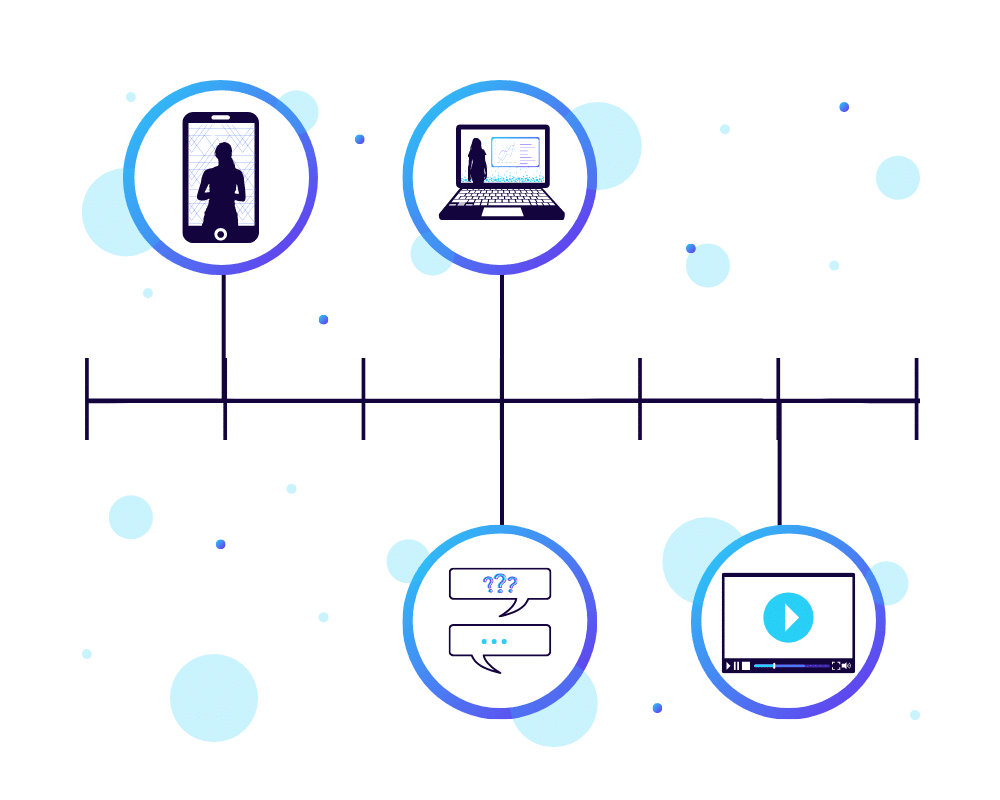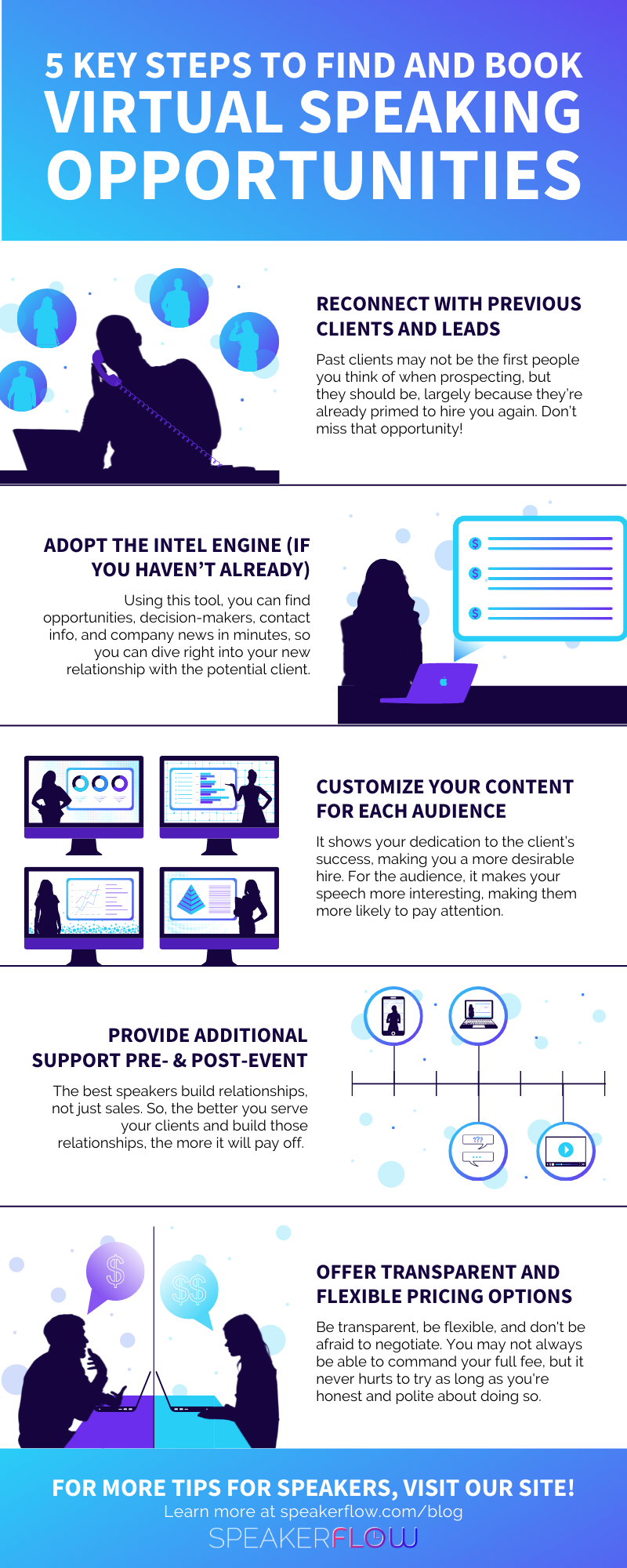With the growing popularity of digital communication, it was only a matter of time before virtual speaking opportunities became mainstream. Among speakers, they’re increasingly looked to as a way to boost income without additional travel, and, among event planners, they’re a way to lower costs and boost attendance, all while providing the same positive impact as a live event.
For each of these reasons – and the value for both parties in a speaker contract – finding and booking virtual speaking opportunities has never been more competitive. In fact, for many speakers, the question isn’t, “How do I find virtual gigs?” Instead, it’s “How do I stand out from other speakers and close virtual gigs consistently?”
With that in mind, this quick and simple guide is all about booking more virtual speaking engagements. Specifically, in the following sections, we’ll cover five ways you can increase your chances of getting booked, from the “Research” phase at the beginning of your sales process to the “Post-Event” stage at the end.
We’ll also share insights from a few experienced speakers already thriving in the virtual speaking market. That way, you don’t have to simply take it from our team. You can follow in the footsteps of your fellow speakers and be on your way to (virtual) sales success in no time. 💪
Reconnect With Previous Clients And Leads
The first step to booking virtual speaking opportunities is to touch base with your existing network. These are people with whom you’ve worked in the past including event organizers, consulting clients, even event attendees. Essentially, they already know and love you. Consequently, even if they can’t necessarily hire you right now, they’ll still be happy to hear from you, and maintaining that relationship could pay off later (i.e. when they next need a virtual speaker).

Speaker and sales expert Meridith Elliott Powell knows this firsthand. As an experienced entrepreneur, her focus has always been building relationships. In her appearance on our podcast, she explained, “You need to sell to your existing customer base because they’re the people you need to show up first to… they’re going to stay loyal to you and you need your existing customers to stay loyal to you.” Put simply, they already know the benefits of your work and so are much more likely to hire you again if they know you saw them as a partner, not a one-and-done sale.
Powell also explained that, when things go sideways and you need business immediately, existing connections are the ones you can rely on. To hear her tell it, when the coronavirus pandemic began, “I just didn’t know what else to do, but I started calling everybody I know and saying, ‘Do you need anything? I’ll do it for free.’” Although some of these calls were a dead end, many turned into immediate deals. Additionally, others took advantage of her free offer but returned with a paid offer later in 2020.
Summarily, past clients may not be the first people you think of when prospecting, but they should be, largely because they’re already primed to hire you again. Don’t miss that opportunity!
Adopt The Intel Engine (If You Haven’t Already)
The second step to booking virtual speaking opportunities is to level up your research. As any accomplished salesperson will tell you, closing a deal starts with knowing your audience. When you consider your potential client, what’s their budget? Are they a small, medium, or large business? What challenges are they facing, and how do my products or services help address them?

Questions like these may sound excessive, and it can be tempting to think, “I’ll just get to know them when I get on a call with them!” However, because speaking engagements – live or virtual – tend to be high-value, multi-thousand dollar contracts, playing your sales calls by ear isn’t going to cut it. If you want to stand out from your competition, the more prepared you are and the better you can demonstrate your commitment to the event, the better.
To do this, it’s imperative that you reserve time in your weekly schedule for lead research. During this time, your goal is to narrow down information about your potential client that may be relevant to your “Please hire me for your virtual event” conversation. This can include changes within their organization, such as mergers or acquisitions, or large-scale changes within their industry.
Admittedly, with smaller companies, finding these details can be difficult, and as entrepreneurs ourselves, we know how little you can afford to waste any time. That’s why speaker and sales guru Sam Richter created the Speaker Intel Engine. Using this tool, you can find opportunities, decision makers, contact info, and company news in minutes rather than hours, so you can speed through the research phase and dive right into your new relationship with the potential client. 👍
Customize Your Content For Each Audience
Next, if you want to book more virtual speaking opportunities, avoid the “one size fits all” approach. As a speaker, every event or partnership is a chance for you to help clients address their challenges or maximize their potential. If they just hired new salespeople, for instance, your goal may be sales coaching through a motivational keynote. If they just hired a new CEO, you may instead manage a workshop on team communication.

In any case, you’re there to identify opportunities for the client to grow, then help them hit the ground running, and, like a doctor, you can’t assume every client has the same underlying opportunities or the same learning style. You have to adapt your communication and virtual programs to suit their needs if you want to succeed.
As freelance saas and marketing writer Marijana Kay puts it, sometimes the dollars are in the details, and understanding your client ahead of time can go a long way on the day of the event, even if it’s time-consuming initially. When preparing for virtual events, she says, “I do my best to ask for specifics about the audience ahead of the session. Their jobs, levels of expertise, and even any particular questions they have make a huge difference in adjusting my wording, points I make, and ways I can keep their attention.”
In short, although it requires more time and effort, customizing your virtual content is better for everyone involved. For you, it shows your dedication to the client’s success, making you a more desirable hire. For the audience, it makes your speech more interesting, making them more likely to pay attention which, by extension, means a bigger ROI for the event organizer. What’s not to love about that, right?
Provide Additional Support Pre- And Post-Event
On a similar note, the fourth way to book more virtual speaking opportunities is to provide tailored support. In every conversation with a potential client, the core question they’re asking – and the real question beneath “Why should I hire you?” – is “How can you help me?”

To answer this question, your best bet is to address the client’s needs in three segments. First is their list of needs before the event. For instance, how are they promoting the event, and how quickly do they need to choose a speaker? The answers to both of these questions will vary. But, if you can say, “I’ll contribute to your promotional efforts, and here’s a PDF with everything you need to know about me,” you’re going to outshine at least a few of the other speakers they’re considering. After all, you’re the one that’s making their life easier.
The second and third segments – during and after the event, respectively – are identical chances for you to provide support. During the event, if you’re able to rehearse and bring backups of your presentation, that simplifies their event prep. After the event, if you’re able to provide executive coaching or group consulting, that ensures your impact goes beyond the virtual stage. In both cases, you’re taking stress away from the event organizer while also helping them meet their goals. It’s a win-win for them!
All in all, booking a virtual or live speaking opportunity depends on your sales skills and offerings – no question. But it also depends on how you can help your potential client before, during, and after their event. Remember: The best speakers build relationships, not just sales. So, the better you serve your clients and build those relationships, the more it will pay off.
Offer Transparent And Flexible Pricing Options
Finally, the last step to booking virtual speaking opportunities is appropriate pricing. Unlike those of live events, virtual speaking fees tend to rely on the outcome of the event more than your stage persona. Because you’re not attending in person, it can be more difficult to capture audience members’ attention, maintain it throughout the event, and make sure attendees leave with actionable takeaways. All of these downsides amount to greater risks for the event planner. This leads many to consider lower speaking fees for virtual events than they would for live ones.

That said, if you want to push that limit – and command as high a fee as possible, you can! Just follow these three things:
- Be transparent. Even if your prices are higher than they want, you’re better off being clear than unpleasantly surprising them later.
- Be flexible. As long as the client is a good fit and has justifiable concerns about your fees, adjusting them is acceptable.
- Don’t be afraid to negotiate. As expert negotiator Linda Swindling mentioned on our podcast, “Basically, negotiation is just seeing if there’s a fit… We’re going to see if our needs and our interests can be met, and most of the time they can”. In other words, if you’re confident a potential client is a fit, it never hurts to ask for your fee. Then, adjust if they want to negotiate.
With these five techniques in your toolbelt, hopefully booking your next virtual speaking opportunity is a piece of cake. For more information about virtual speaking, check out our previous guides, “8 Traits Of An Exceptional Virtual Speaker” and “12 Features Of The Most Impactful Virtual Keynotes.” 👌






